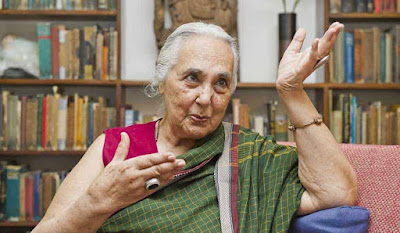Romila Thapar had to write a book to answer her detractors who criticized her as a leftist historian. I knew that was a very unfair judgment on her. Recently, I bought her latest book " Our History, Their History, Whose History."
Romila Thapar
is denigrated as a Marxist Historian by the BJP and its supporters. But why did
they label her thus? Is that because she wrote a history not in tune with its
ideas? But History cannot be written according to some agenda. It flows as per
corroborative evidence. No doubt each historian has their own bias but
ultimately whatever they write is based on corroborative evidence and is not
like fiction without any evidence.
Let us
examine what is the background of Romila Thapar. She was born in 1931 and is the daughter of Lieutenant General Dayaram Thapar who served
as the Director General of the British Indian Armed Forces Medical Services. General
P.N.Thapar, her uncle was the Chief of Army Staff during the 1962 India-China
war.
She did her
schooling in Pune and also did her Intermediate at Pune. She then graduated
from the Punjab University in English Literature. She then obtained a 2nd
honours bachelor’s degree in History at the School of Oriental & African Studies,
University of London and went on to take her Doctorate from London University
guided by no less than A.L.Basham, the author of ‘The Wonder that was India”.
Romila Thapar
was a Reader in Ancient History at Kurukshetra University in 1961-62 and in Delhi
University between 1963-70. She wrote the History of India Volume I which
narrates Indian History from ancient times till the arrival of the Europeans in
the sixteenth century.
She holds
Honorary Doctorates from the University of Chicago, the University of Oxford
and the University of Edinburg. She holds many more honorary positions apart
from these.
Both in 1992
& 2005 she declined the Padma Bhushan. To President Abdul Kalam she
explained that she only accepts awards from academic institutions or with those
associated with her work and not state awards.
She never
married and seems to have dedicated her life to Indian History. Romesh Thapar,
the TV Journalist is her cousin.
In the year
2002 itself the then BJP Government changed the CBSE school textbook for Class
VI and deleted some passages which she wrote without even informing her. She
protested to the Government and therefore has become a Marxist to some people.
Romila Thapar
is a visiting Professor at Cornell University, the University of Pennsylvania
and the College de France in Paris. She was elected the General President of
the Indian History Congress in 1983.
ROMILA THAPAR-“OUR HISTORY, THEIR HISTORY, WHOSE
HISTORY?
Romila Thapar
says there is a difference between a trained Historian and one who professes to
know history.
The former
researches in depth for a happening and tries to find corroborative evidence.
Only when events are matched with a number of sources, it becomes established
history.
For a person
who professes to know history no such proof is needed. They have a narrative
for buttressing their narration which they conveniently call history.
What the
latter quote is not history. History does not come in from a social media post
on Facebook, YouTube, Twitter or Whatsapp. It comes from painstaking research
on the subject and even then it can still be imperfect and can be challenged by
other Historians. (This para is mine and not Thapars)
To claim that
it is history when there is a narrative without any corroborative evidence is
not at all in tune with the modern methods. This narration is no better than a
mere viewpoint and cannot be called history.
She gives an
example for this. India claims it knew about Democracy before everyone else.
Athens in
Greece was known as a cradle of Democracy for the West. But what type of
Government did Athens have? All its citizens did not have a vote. Only the
freemen had vote. Their slaves whose number was numerous did not have any
voting rights and neither did their women. So their democracy is not the
Democracy the West practices today. Yes a rudimentary type of Democracy did
exist in Greece then, but the Modern Democracy we practice today is totally
different from what was practiced then in Greece.
Some people
claim that the Indian tradition in the ancient times practiced Democracy
(Example are the tribal republic of the Licchavis of which Buddha’s clan Sakyas
was a part). The Indian sources do maintain the centrality of “Gana Sanghas”
& “Gana Rajyas”. These are more prominent in the Buddhist texts than in the
Brahmanical texts.
These tribes
actually represent clan based societies where a particular clan would be
dominant. These Republics did not mean that everyone was held equal and
everyone had a right to decide what to do. In these Sanghas or Sabhas seniority
is more of a qualifying factor than merely being a member of the clan. Also it
should be noted that it is the Kshatriya families who more frequently sat in
these assemblies. The Shudras and the Dasas despite being in a majority were
not considered in these bodies. The Panchayat’s of the medieval times and the
village assemblies had a selected membership more based on caste with the
higher castes occupying maximum numbers.
So we too had
a rudimentary form of Democracy like Athens did, but the comparison of a modern
Democracy with the either the Athenian or Indian context at that time is
meaningless. But some people say everything is invented only in India. No doubt
India has given some fundamental ideas to the world but to say that we invented
everything is foolishness. (This again is my own comment and not Thapars)





No comments:
Post a Comment